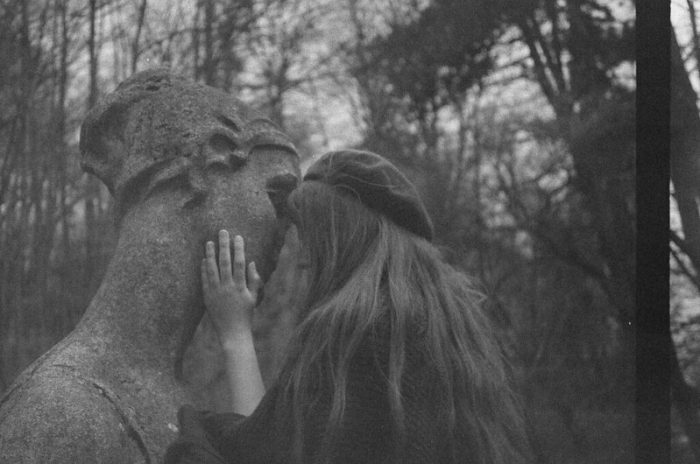One of the ways I naturally mourn is through the unsettling bellows of primal sounds—ranging from wails of agony to fiery rage and warm tears—grasping for air in between.
It feels like a piling wave of emotion crashing on heart-wrenching thorns. Sometimes it stirs, ever so quietly, in the pitch dark of night, where silence sings lullabies before dawn opens her eyes and before birds begin their morning ritual.
This portal of pain fuels passion and deep care because once acknowledged and expressed, there is some sense of kinship with the void. Something lies flickering within the raw and tender act of grieving.
When I allow myself to be with sensations of deep despair or loss, it feels as though it transforms into ceremony. My crackling voice becomes the song, tears become holy and comforting, and my jagged breath smooths out and sweetly rocks me into a presence that had been waiting for me since the beginning.
I feel gold slowly filling cracks of a once-broken bowl. After a deep release, there is an aliveness that sets in. Relief bubbles up, peace begins its solo in my body, and clarity of what is revealing itself.
“Grief expressed out loud for someone we have lost, or a country or home we have lost is in itself the greatest praise we could ever give them. Grief is praise because it is the natural way love honors what it misses.” ~ Martin Prechtel
The deeper emotive experiences are done alone and far away from ears sight. There is the worry of neighbors hearing me explode with sounds of agony and disturbing the cadence of day-to-day life. It generally isn’t accepted outside the bracket of time allotted by society to mourn, and rarely spoken about within the community. There are grievances that range from feeling the loss, be it from a loved one who has died, a fractured relationship, a business turned south, or even an idea we had about ourselves, others, institutions, beliefs—the list goes on.
The way we can honor the message of our emotions is to allow them to be expressed. It is vital to feel the spectrum of emotions for that’s what makes us human. Praise then becomes more of a hunger that needs satiating and increases its value in our lives.
What if there was a normalcy to grieving without there being some sort of expiration date to the process?
If we can begin to learn about the gifts that death and loss bring to us, maybe we can begin to feel more ourselves and attempt to numb less.
Befriending pain and giving it a seat at our table can make meaning out of the tragedies of life.
“When you’re grieving for the thing you got, it’s praise. And when you’re grieving for the thing you lost, it’s grief.” ~ Martin Prechtel
In a talk about grief and praise, Martin Prechtel, an American author and educator, shares of the Tzutujil tribe of a Mayan village that he lived with for a time in Guatemala, off the stunning shores of Lake Atitlan. One of the traditional jobs of the community are professional weepers, or as I see it, guardians of grief.
Mostly done by women, they meet the family who lost a member and find out more about the situation. They then start to empathize with what’s going on and begin giving elaborate speeches. This bridge of communication bubbles up all the emotions, initiating the grieving process for the family. It’s a service for not only the loved ones but for the whole tribe.
There’s an understanding and respect for this kind of work, and in that, an acceptance of primary nourishment for human beings to experience. It’s an example of maintaining a healthy communion to the ones once living and breathing, a necessity to their community’s way of sustaining their connection to the gifts of life and death.
Remember, our emotions are intelligence that speaks through sensations within our bodies. Recognize and claim them with your attention and gentleness. Give narratives of past traumas room to just be there as they are.
Reframing our relationship to grief and seeing the value in its nature amplifies our relationship to our connection to celebration. Expanding our range of feeling is like walking the bridge between grief and praise.
What if feeling our grief shamelessly shifted our perception radically on how we see suffering?
Grief can show up in all forms and for many different reasons. It can happen in phases and for as long as it needs. Our suppression makes for more clogging.
When we make time and hold space to allow for feeling our own mini deaths, we touch upon that surrender in our own way. Our daily lives will only benefit from time well spent to reinvigorate the soul and collect the potent medicine tapped from our courage to go there.
Supporting people in our circle starts with safety, and when we can feel safe to share and be seen in our seemingly chaotic emotions, this creates a chance to open the bridge of contact with the sacred.
Even when it feels like we are alone in a culture that promotes individualism and a carry-on approach, our strength lies upon our ability to reach out and help one another.









Read 10 comments and reply